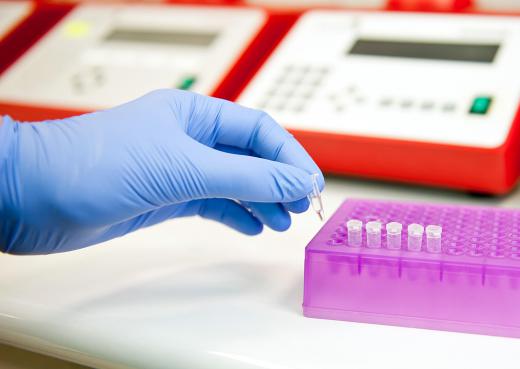What Is a Peptide Assay?
 Mary McMahon
Mary McMahon
A peptide assay is a laboratory examination of a sample to detect the presence of peptides, short amino acid chains that play a key role in many biological functions. The assay can identify which peptides are present and provide information about their concentrations in the sample. There are a number of ways to use a peptide assay and many labs have the capability to perform one on request.
In the scientific community, researchers perform peptide assays to learn more about the physiology of the organisms they study. The presence or lack of peptides can also be an important diagnostic indicator that may help epidemiologists and other disease researchers understand disease and develop reliable tests for various medical conditions. Such testing can also be useful for identifying new peptides that may have potential uses in the development of pharmaceuticals, new medical treatments, and other tools.

Peptide assays may be ordered in medicine for diagnostic purposes. Levels of peptides in the body can change in response to stressful factors like disease, and a doctor can request the test in patients with cases of suspected diabetes, heart failure, and certain other conditions. The peptide assay may help a doctor rule diagnoses in or out, and it can provide information about the patient's condition. It may reveal advanced disease, for example, or a slow response to treatment that could be encouraging. The lab can provide sample values for other patients to give the doctor an idea of the range a patient falls into.

Researchers working in a lab can perform a peptide assay and compare the results against a peptide library, a collection of known peptides with as much information as possible about their function. Lab equipment may be able to do this automatically and can generate a complete report, including identification of any unknown or apparently mutated peptide chains. Researchers can use samples from a variety of organisms to learn more about how different organisms construct and use peptides.
The process of performing a peptide assay can vary between labs. Each lab has a standardized procedure it expects personnel to follow, with specific chemicals and solutions at each stage. The standardized format reduces the risk of error and makes it easier to repeat test results. Researchers can also send out samples to independent labs for verification. Scientific supply companies sell tools for peptide assays, including lab equipment, solutions to use in testing, and so forth.
AS FEATURED ON:
AS FEATURED ON:












Discuss this Article
Post your comments